You probably know that many MLMs produce income disclosure statements. But these statements are often deceptive, misleading and even leave Sherlock Holmes confused.
Chances are you've been looking for a legit way to make money from home for some time now.
And there are new MLMs created every day. With the low barrier to entry, many people consider this as a great way to become their "own boss".
But just how many people actually make any money as a MLM rep?
This MLM income disclosure statement study has researched 167 multi-level-marketing companies. By using the income disclosures & compensation plans that were provided (and some detective work) it proves exactly how many people make money as a member of MLM companies.
MLM income disclosure statements infographic
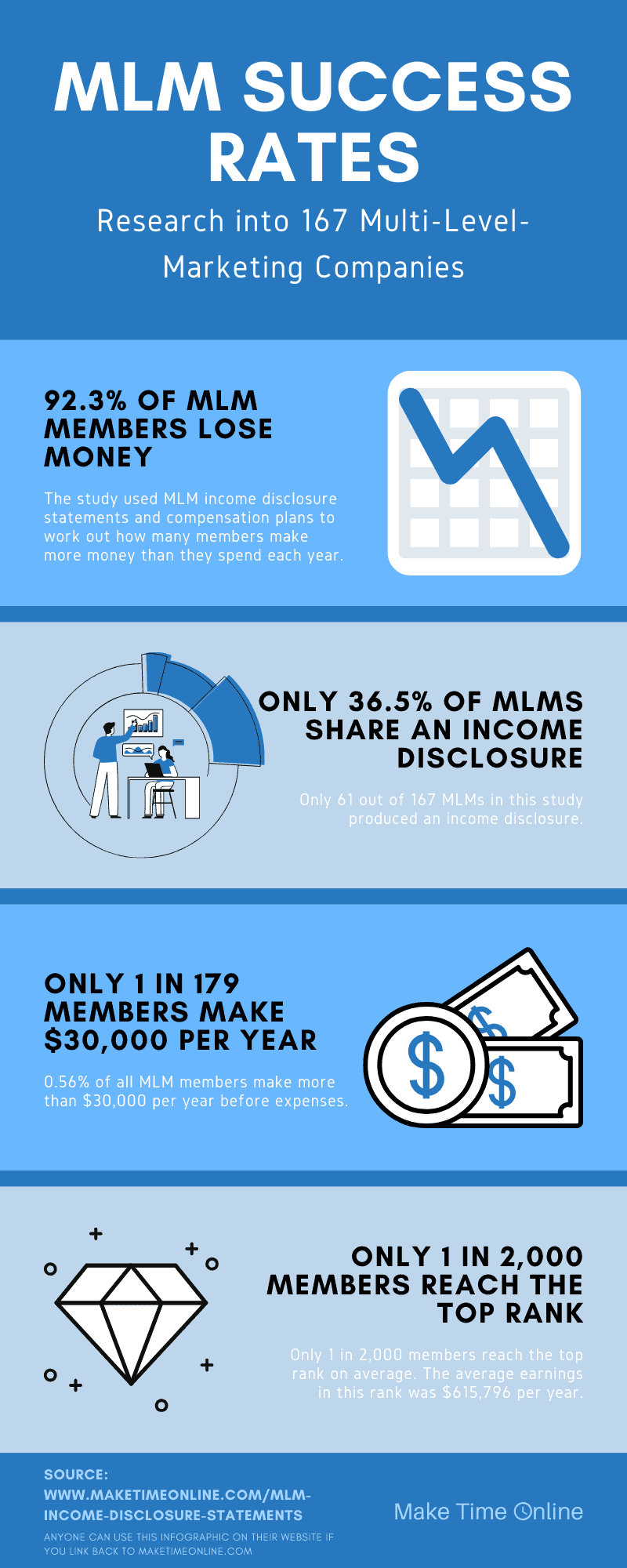
You can embed this infographic into a blog post through Visual.ly
*Feel free to use this infographic or any of the stats in this study. All I ask is that you kindly link back to this study from your post.*
MLM income disclosure statements study
A 2011 FTC study suggests 99% of all MLM representatives from 350 MLMs lose money. But I became very intrigued into how this research was carried out as it's quite a bold claim.
Was it really that accurate?
After all, other research suggests that 73% of MLM members lose money.
And here's a quote from the FTC research...
"MLMs make gambling look like a safe bet".
Is it just me or do you feel like there is some sort of bias from Jon Taylor (the guy who produced this research)?
Now, I'm not saying that I am "for" MLMs and I completely agree with many of the points he makes in the study. You just need to compare the difference between Affiliate Marketing vs MLMs to see the issues in the business model.
Previous flaws in research
However, there are some clear flaws I found in previous research:
- Assumptions are made about the members annual expenses
- Estimating drop out rates (sometimes pressuming as low as a 5% annual retention rate)
- The profit/ loss calculation multiplied the final number by 0.1 to account for previous years drop out rates.
- Many MLM members earn income from purchasing products and selling them on in person. This income cannot be shared in income disclosures as there is no way to track this.
Now, I don't deny the thinking here. There is proof that 90% of all MLM members drop out within the first 5 years of joining. Nevertheless, some of those who have dropped out will have made a profit, even if it was small.
Also, it's likely that some of the active members not making profit in the current disclosure will make profit in the future. But there is no way for us to know what these figures will be.
Therefore, I personally think it's only fair to go off the current stats produced by the MLMs to avoid biased presumptions.
How many MLMs have income disclosure statements?
167 MLMs were used in this study.
But only 61 of these MLM companies produced an income disclosure statement. This means that...
36.5% of MLMs produce income disclosure statements.
There's no legal reason for MLMs to produce these income disclosures but it is an opportunity for the company to represent themselves more fairly and honestly.
MLMs often have the label of a "get rich quick scheme" or "pyramid scheme".
If they provide a legitimate income disclosure it is a great way for them to be more open and honest to people considering joining. However, many MLMs go to great lengths to manipulate these figures, as you may have seen before!
MLM success rate
This study found that...
Only 7.7% of all MLM members make any money.
It's a success rate that is still very low considering that legitimate small businesses are profitable 39% of the time.
But this is a statistic that is certainly in line with previous research into MLM success rates.
Calculating how many people make money in MLMs
We wanted this research to be fair and unbiased.
But we also wanted it to be as accurate as possible.
And if you've ever looked at a MLM compensation plan or income disclosure before you probably know it's easier to solve a rubik's cube blindfolded than it is to understand them.
Here are just a few of the issues we were up against and how we solved the problem...
Issue 1- Hidden members in MLM income disclosure statements
It's common for MLM income disclosure statements to only include "active members" in their stats. There are very few transparent income disclosures like this...
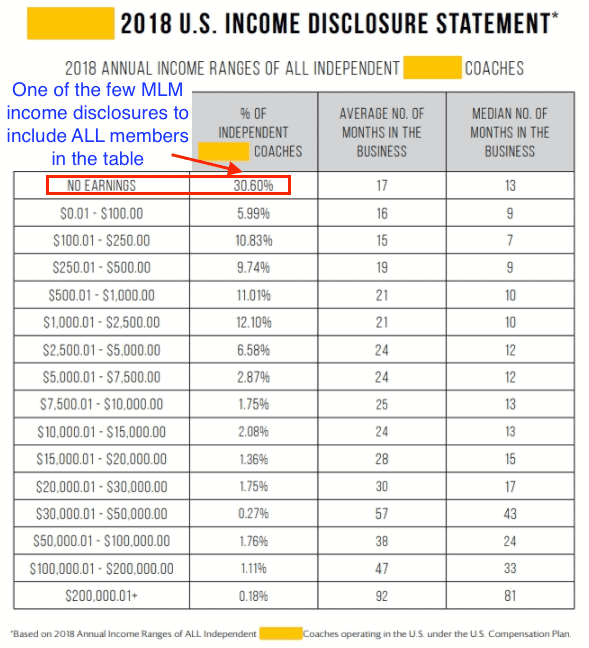
However, not every income disclosure makes it clear about who is and who isn't included in the numbers.
Solution to hidden members
The answers were often times in the small print on the disclosure. It just took a bit of detective work to calculate the correct numbers.
But luckily, there were only 3 out of 61 statements that we couldn't confirm who was included in the stats. The average "success rate" of these MLMs was 8.8% so they are still pretty close the average and are marked in the table below with an asterix (*).
Issue 2- limited number of MLM income disclosure statements
Only 61 out of 167 MLMs provide an income disclosure.
It's not a legal requirement for MLMs. But it's certainly a red flag if it isn't provided as it's promoted as a "business opportunity".
Solution to limited income disclosures
It could be argued that these companies have an even lower success rate. So we could account for that in the figures with an estimate.
However, we want this research to be as unbiased and accurate as possible. So any MLM that doesn't provide an income disclosure wasn't included in the final stats.
Issue 3- Not all income is tracked
A huge issue not even accounted for in the FTC 2011 study was this...
Income made from buying the MLM products at wholesale price and selling them on at retail price in person cannot be accounted for in income disclosure statements.
There is no way for MLMs to report how much money was made from their members by selling physical products to friends and family in person. See an example below...
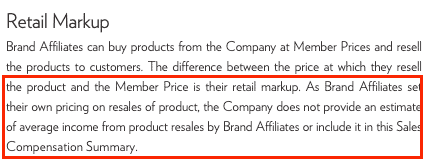
Many MLMs encourage their members to purchase a "product pack" with a range of products at a discounted price at the start. This could be used personally or sold on to friends and family for a profit.
"Home parties" or selling physical products in person is still a huge marketing tactic used by MLM members. However, income disclosures cannot account for this (they only track income from bonuses and commissions made from the individuals websites).
Solution to allow for missing income
There's no real solution to this issue as it can be totally different for members. But this is another reason that we conducted the research accounting for these things:
- We only used the stats provided- we did not account for previous members who lost money before the documented year
- The expenses we used were the lowest average expenses without taking into account other unknown costs
- Not all MLM members focus on selling products in this method
We feel this balance of using the figures provided and giving the MLMs the benefit of the doubt for expenses helps to make the stats more accurate.
Issue 4- Expenses not included- income is not profit
The figures provided in income disclosures is not profit.
MLM members will also have ongoing expenses to market the products or to "remain active". When you read the small print you find out the sneaky truth...

Small print reads: These figures do not represent Independent Consultants' profits, as they do not consider expenses incurred by Independent Consultants in the promotion of their business and do not include retail commission from reselling products.
But there are even disclosures that don't even acknowledge the figures are just gross revenue and not all profit.
Solution to working out expenses
We used the MLM compensation plans to find out:
- Total cost to join
- Costs for a "product pack" (or equivalent)
- Monthly sales quota (i.e. 100 PV per month is often $100 a month)
- Other monthly requirements i.e. cost for a website or autoship
We did not account for additional unknown costs such as:
- travel expenses,
- additional training,
- postage and packaging
- or any other marketing expenses
Therefore, the unknown costs of potential extra income from reselling of physical products is a fair way to cancel both of these unknowns out to get more accurate figures.
Here is an example of the costs we know for certain from a MLM...

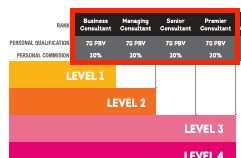
- Zurvita costs $35 to join.
- $139.95- $549.95 for one of the "start pak"
- 70 PV sales quota = $100 x 12
Total cost for 1 year = $1,374.95-$1,784.95
An argument here is that any sales members make each month can be taken off the monthly sales quota.
However, most MLMs encourage an "autoship" to make sure they "remain active" and therefore spend the money every month.
Other people argue that if members are using the products themselves then it's not really an expense. But products can typically be found for a fraction of the cost elsewhere and rarely need to be purchased in the quantities required to "remain active".
How many MLM members lose money?
This research proves that 92.3% of all MLM members lose money.
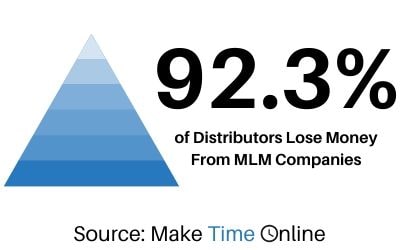
The information provided from 61 MLMs in their compensation plan and income disclosure is enough to fairly and accurately prove this without assuming additional expenses or profit.
Tired of the 9 to 5 grind? Check out how I make money online here!
61 MLM income disclosure statements
|
Key Findings
- The range of MLM members who lose money = 72.5%-99.91%
- Total average MLM members who lose money = 92.3%
- The average amount of members earning over $30k a year = 0.56%
Research disclaimers...
* MLMs that did not disclose if their income disclaimers include all members or not.
** Average annual expense = Joining costs + Product pack + monthly sales quota
4Life example...
- $25 joining fee
- $146- $525 enrollment pack
- 100 PV monthly sales quota = $120 x 12
Total cost for 1 year = $1,611- $1,990 (average = $1800.50)
***Using the income disclosures: % of members earning less than the avg expense + weighted amount of percent in the next "income category".
4Life example...
- 16% of distributors earn no income at all
- 86.7% (88.8% overall) earn less than $900
- 96.7% (97.2% overall) earn less than $6,576
91.1% of all 4Life members earn less than $1,800.50 per year and therefore lose money.
106 MLMs without income disclosure statements
|
The bottom line
Previous research has over generalised success stats inside MLM companies. They have used assumptions around how many members have dropped out in previous years and do not account for all profit made by members such as direct retail sales.
It is possible to make money from MLM companies.
However, the focus on recruiting and selling overpriced products means that most people do not make money.
The only way to make decent money in any MLM is by recruiting a lot of people who will inevitably lose money. Which is hardly an ethical business model.
Hence, it's clear to see why 92.3% of all MLM members lose money.
*Please do share this with anyone that you think may find this useful. Feel free to use the graphics or any of the stats in this study. All I ask is that you kindly link back to this study from your post.*




wow that’s some eye opening stuff. but the question is: is it the company’s fault or the individual’s fault? I’ve always believed that it’s important to train people on how to recruit and to make sure that they understand that being in mlm is a sales gig regardless of how people try to say it’s not. Sales skills have to be developed and that takes a dedication that many people just don’t have. I’m glad you have a way to make money.
Too true LaShaun! I wholeheartedly believe that anyone can make money inside MLMs.
However, there is one huge flaw in the business model that not enough people understand…
The focus still needs to be on recruiting. And when that is the case, it’s impossible for all members to make good money. Yes, of course, they can sell some products and maybe break even if they’re lucky. But at the end of the day the majority of people will lose in MLMs. And that’s not really an ethical business I’d want to promote to others.
It’s quit difficult for anyone to survive in the MLM business the numbers alone tells you that you are fighting a loosing battle.
It cannot even come pare to affiliating marketing. I would advice persons who are thinking of getting into the MLM business to compare it with what wealth affiliate has to offer first.
Thank you for a wonderful review.
Hey Marcia,
Great points made there…
Affiliate marketing and small businesses do not rely on recruiting anyone to make money.
Do most people still lose money? Yes!
But It is purely by adding value/ providing something that people make it work. It IS possible for everyone that does affiliate marketing/ starts a business to make great money from it eventually. It is NOT possible for that to happen in MLMs
Personally, I think people should use the skills learnt in either MLMs or Affiliate Marketing to eventually create their own business and add some value to the world themselves as they are both a pretty oversaturated market. But the skills I’ve learnt from affiliate marketing could help with any future business endeavour.
*disclaimer- Just my opinion and I know everyone has different ones…
Thanks for such an awereness.selling an overpriced product to a customer is not that good to a business ,cuzyou might end up loosing that customer,when he/she finds out that the price is on the high side esp. with product that can be substituted for.Also the main purpose of entering into a business is to make profit,if this purpose is not fulfilled ,there is bound to be turnover.
thamks,best regards.
I couldn’t agree more
I think the reason most people lose money through MLM companies is that most insist that you need to buy products or starter packs or even make a set amount of monthly sales, which ends up costing as most are funding themselves to get started, and once they realize how hard it is to sell they give up.
I think it takes a certain kind of person to make it in this industry, and you need to be quite pushy and self-driven to be part of the percentage that do succeed.
For someone who still wants to go the MLM route, what would you recommend the best ones to join are?
Too true Michel! I couldn’t have put it better myself!
I have reviewed over one hundred MLMs and the only one that I can see as being ethical with prices in line with the industry and no monthly sales quota’s is Farmasi.
However, the best way to do well with the company if you treat it like an affiliate marketing business and create your own website. Personally I just don’t think MLMs are very ethical because you can only really make money by recruiting people and they end up losing money.
Thanks Mike for a very well thought out, comprehensive, well put article.
Agree, you can make/bend statistics anyway you want, and unfortunately that means that people are on the receiving end of ‘fake news’. Thanks for presenting different angles on the subject, and highlighting the bias.
The benefits of affiliate marketing is that you can always operate ethically, in the best interest of consumers by providing a genuine service that is win:win for all.
Exactly Dipesh! I do not doubt that people can make money in MLMs.
However, the focus on recruiting means that the majority of people will always end up losing money. That is not the case with affiliate marketing & the skills you learn from affiliate marketing can really help for future endeavours!
Hello; MLM Disclosure Statement, my question is: Do you believe the truth is told in all MLM Disclosure Statements? It is a fact that not all MLM companies behave the same when it comes to transparency. However, because they are all MLMs, many people categorised them as Pyramids.
It is not an easy task for their Disclosures to have a correct count of their membership due to some factors involved. It is true, though, that many people who join the MLM company lose their money because of the promised income to earn from becoming a member.
DorcasW
Absolutely not! I believe that most of them have the main information on the page but they “skew” the figures to make it seem much better than it really is. This research dug into each disclaimer to find the true figures taking into account all members not just the “active ones” like many income disclaimers point out
I´ve given MLMs multiple changes as a side income opportunity. People that know me well understand I´d do great as I´m outgoing and talkative by nature. In any case, those 2 qualifications are far away from being enough to make money in that industry.
It always was hard for my trying to migrate someone from consumer to ambassador (or affiliate) as it intrinsically meant that I had to explain that 5 or even more levels of people were profiting from his/her buys what has the associated implication of value reduction of the goods received. One of the most common reactions is feeling scammed and not only not becoming part of the production engine, but quitting product consumption.
Thanks for getting this exhaustive research! It just confirms what I´ve lived first hand with MLMs.
No problem, I’m glad it could help
Hi Mike – It is astounding to me how MLM companies blatantly take advantage of people and they have been doing it for decades without any legal retribution. I agree that affiliate marketing is a much cleaner way of operating. Kudos to you on your research and the production of such a thorough post.
Thanks Nathaniel! I agree 100%
I think your article backs up my experience with MLM businesses I have been involved with in the past. So glad I made the step away from this industry and moved int affiliate marketing.
Thanks for sharing Martin!
Oh wow! Great and informative information! Thanks for sharing.
Thanks Jamie, glad you liked it